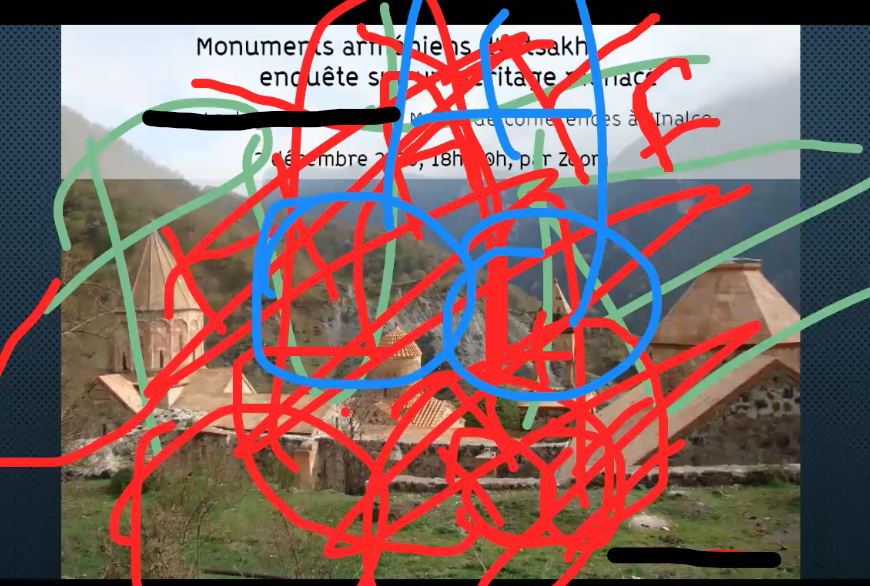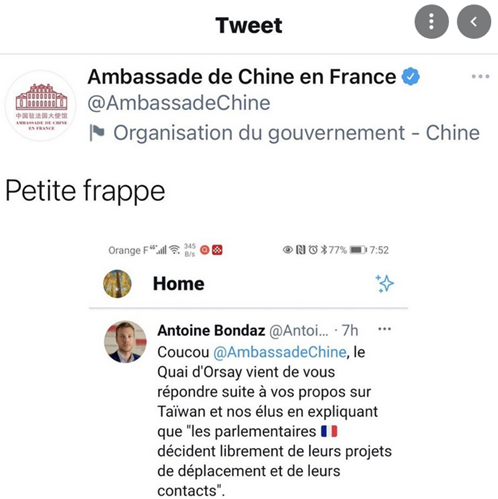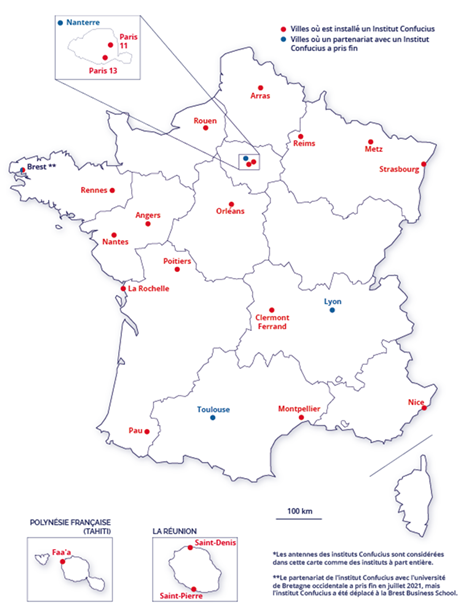ANNEXE II - ENGLISH
SUMMARY :
BETTER PROTECTION FOR OUR SCIENTIFIC ASSETS
AND ACADEMIC
FREEDOMS
Focus on the report from the fact-finding mission on non-European State influences in the French academic and university sectors and their impact
France's research and higher education sector is no longer shielded from foreign states influence, with certain state actors using systemic strategies that verge on interference. This is the conclusion of the fact-finding mission established in July 2021 at the initiative of the Rassemblement des démocrates, progressistes et indépendants (RDPI) group, chaired by Etienne Blanc (Les Républicains, Rhône) with André Gattolin (RDPI, Hauts-de-Seine) as rapporteur.
After more than 30 hearings, questioning all higher education establishments, and extending the investigation to several countries that have already been impacted, the fact-finding mission seeks to raise the alarm on the reality of the threat. It sets out 26 recommendations grouped into five objectives to prepare institutions and provide our country with the tools to tackle what will be one of the 21st century's big challenges: preserving and protecting our scientific assets, academic freedoms and research integrity.
1. A VERY REAL THREAT IN THE MIDST OF RISING GEOPOLITICAL TENSIONS
Ø Influence strategies that overreach the bounds of traditional international relations
Foreign influence in the academic field has long been ignored and poorly documented, but it now constitutes an essential facet of international relations that have become increasingly aggressive in recent years.
These complex and ever-changing influences fall under two very distinct but often-confused major categories of objectives:
ü Shaping a State's image or reputation or promoting an official `narrative' by instrumentalising human and social sciences,
ü Intrusion and the theft of scientific data that is sensitive to the national interest or protected by intellectual property, in order to obtain a strategic, economic or military advantage.
Both influence and intrusion can take place through incentivising or coercing individuals into these actions. In either case, they are a major risk for the target country.
Ø Alarming examples abroad and responses that should inspire us
China currently appears to be the country most able to conduct a global, systemic strategy of influence due to both its power and its ability to implement long-term policies. In the future, other countries that are already deploying more offensive policies, such as Russia, Turkey or certain Persian Gulf countries, could replicate this scheme.
English-speaking countries (Australia, United Kingdom, Canada, United States) have been aware for several years of the vulnerabilities of their university sectors. For example, the Australian and British academic sectors are more dependent on tuition fees from foreign students and, therefore, on potential pressure from those students home countries. Their parliaments started to study a legal framework and guidelines to protect their higher education and research.
2. FOREIGN INFLUENCE IN FRANCE: RAISING AWARENESS, SETTING PRIORITIES
Ø Attempts at influence are still rarely documented, they are indeed present
The fact-finding mission was kept informed of several worrying examples of influence, in addition to the most high-profile attempts, such as the live hacking of an online conference on the Armenian legacy by pro-azerbaijani activists and the undiplomatic language used by China's embassy towards researcher Antoine Bondaz.
Inspired by the Alliance Française network, the Confucius Institutes, present in France since 2005, are the best-known example of foreign influence from China.
17 Confucius Institutes in France
|
Present in France since 2005, the Confucius Institutes are mainly located in middle-sized cities with a university. Reasons for these locations being chosen include: ü a dense territorial network in France while maintaining a certain discretion, ü the strategic interest of some cities, such as Brest and its naval base, ü shortages in Chinese language and culture classes. |
|||
|
It is impossible to draw up an exhaustive list of all the cases of influence, since reports are not systematic and because it is difficult to identify such influence with precision. In its recommendations, the mission calls for an exhaustive study and dynamic mapping . |
`Only' ten seriously threatening cases reported in France in 2020 |
||
Ø Weaknesses in our higher education system make us vulnerable
The mission observed that the French academic field has begun to be vigilant towards the risks that weigh on academic freedom from foreign attempts at influence. Whilst freedom appears to still be relatively protected, France remains a prime target given its reputation for academic excellence and the combination of three factors that constitute points of vulnerability:
|
|
Ø insufficient budgetary resources manifested by less favourable pay packages and working conditions than in other countries, Ø administrative weakness in management at autonomous institutions and subjected to contradictory demands of welcoming foreign students and more rigorous control, Ø the culture of openness of a research sector that is by nature reluctant to view its activity in a context of conflict and national interest. |
Ø Types of impacts
There is an inter-ministerial structure to protect the nation's scientific and technical assets (PPST) directed in each ministry by a senior defence and security official (HFDS) who leads a network of other such officials (FSDs) for higher education institutions. But there are three observations we can make:
ü the threshold for vigilance is too high and only applies to the very high risks of stealing knowledge and expertise (economic and military interests, proliferation and terrorism),
ü it is not suited to new strategies of influence targeting the human and social sciences, that largely fly under the radar of academic and legal institutions,
ü finally, it suffers from a general lack of resources, coordination and awareness of these new threats by the academic community.
The fact-finding mission established an assessment framework to measure the impacts and public policies according to the intensity of the risks of influence.
The assessment framework of influences, their impact on the university sector and the related public policies
|
Scale of risks |
Repercussions |
Public policies |
|
Influence |
Activities which, when they are conducted openly and transparently, are a normal aspect of international relations and diplomacy that can positively contribute to international public debate. |
A free and open domain subject to public policies of influence diplomacy (diplomatic, cultural, economic networks, etc.). |
|
Risk grading: - Interference - Meddling |
Malicious activities by one State or organisations acting on its behalf intended to harm the interests of another State: - pressure, censorship, visa blackmail, - fraudulent, corrupting or coercive activity, financial incentives, - misinformation, online reputation attacks and other cyber-activities. |
A ` grey area ' that is not precisely defined, not characterised academically or criminally, and not mapped by French public institutions, - Gaps in the legal resources, - A field not covered by a dedicated mechanism for reporting and centralisation of information. |
|
Intrusion |
Unauthorised entry into restricted areas such as research laboratories or strategic production plants to be protected due to the interest they hold for the institution's or the nation's competitiveness (Article 413-7 of the French Criminal Code: 6 months of imprisonment and €7,500 fine) |
The inter-ministerial network to protect the nation's scientific and technical potential (PPST): - A mechanism that relies on a structured SGDSN-HFDS-FSD network, - Only applies to `hard' sciences and technologies for high-risk fields (national economic interests, military arsenals, proliferation, terrorism), - Does not apply to human and social sciences. |
|
Theft |
The theft or interception of documents or materials in a restricted area (Article 411-6 of the French Criminal Code: harm to fundamental national interests, 15 of criminal imprisonment and €225,000 fine). |
|
|
Treason and espionage |
Articles 411-1 et seq. of the Criminal Code define crimes relating to intelligence and delivering information to a foreign power. |
Intelligence and judicial services, - Heavy incrimination and difficult to characterise, - No cases reported by the services in the university and academic sectors. |
3. PRESERVING OUR RESEARCH AND VALUES WITHOUT BEING NAIVE
Ø Avoid undermining our academic sector
The mission stresses that any action taken to protect the French academic sector must achieve a complex balance between:
ü an academic sector historically founded on sharing knowledge and circulating ideas, on the one hand,
ü new planned strategies, designed for the long term and executed with considerable resources by governments that we could sometimes consider as hostile, on the other.
Calling this balance into question would weaken higher education and research even further, either by leaving it totally vulnerable through a lack of protection, or by placing it in contradiction with its founding values.
The fact-finding mission noted several worrying statements about the self-censorship that some academics may be practicing when they handle certain questions related to complex geopolitical situations. For example, several people the mission heard had to face worries from colleagues about potential harm to relations with countries that are `sensitive' about their image.
Ø A public policy that still lacks full commitment
There are administrative structures already in place to handle these questions, particularly the policy to protect the nation's scientific and technical assets (PPST). However, it only covers a limited number of research units, does not take into consideration the risk related to the theft of knowledge and technology, and does not handle academic freedoms and research integrity, which have been very specifically threatened in recent years.
Furthermore, the system overall still seems too weakly coordinated, information is poorly shared, and both institutions and researchers are too often left to fend for themselves, a sign that detecting and handling foreign influence is still not a priority for public authorities.
Ø Responses on three levels
The response must be multi-factor and scalable, given the ability of foreign influence strategies to change and exploit the weaknesses of target States.
There are three closely related levels of vigilance and policies to be put in place:
ü the government, which must be responsible for national steering, centralising alerts and determining the appropriate responses, particularly via the Senior Civil Servant for Defence and Security and the board of ethics in higher education, which must improve how they coordinate with each other and the network of FSDs and the relevant ministries (foreign affairs, interior, armed forces, economy),
ü the higher education or research institution, which must promote a culture of responsibility to research staff and reinforce defence and security civil servants (FSDs) in their roles, their network culture and their sharing of best practices in conjunction with research integrity and ethics experts,
ü research staff, who must be informed and trained at a very early stage. Education is necessary for the research world to truly accept the vigilance that is now required.
4. THE FACT-FINDING MISSION'S RECOMMENDATIONS : BETTER PROTECTION FOR OUR SCIENTIFIC ASSETS AND OUR ACADEMIC FREEDOMS
The fact-finding mission identified five major objectives for which it made 26 proposals.
Ø Objective 1: Make the issue of foreign interference a political priority to assess the current situation and develop appropriate responses in cooperation with the university sector
1. Draw up an inventory of the alerts, the number of reports, and corrective measures and assess the level of foreign influence in higher education and research.
2. Establish a scientific committee as an `observatory of foreign influence and its impact on higher education and research' that brings together academics, the ministries of Higher Education and Research (MESRI), the Economy, the Interior and the Armed Forces. It would be tasked with assessing and regularly monitoring the situation and making proposals to the government.
3. Task the committee with drawing up a scientific benchmark study on the status of the threats observed in France. This document, which would be updated regularly with an assessment of the changes, would include an overview of the threats from outside Europe and a mapping of the risks, both topically and geographically.
4. Provide for this study and its updates to be sent to Parliament. Its observations could be the subject of a debate.
Ø Objective 2: Help universities to protect their values of academic freedom and research integrity, while respecting their autonomy
5. Extend the protection mechanism for the nation's scientific and technical assets (PPST) to all university fields, especially by adjusting them to the issues and influences specific to the human and social sciences, which are currently excluded.
6. Entrust the higher education, research and innovation ethics board with a reinforced mission to lead a network of ethicists within institutions and the identification procedure.
7. Ensure information is exchanged regularly between the ethics board and MESRI's senior defence and security official (HFDS) on any issue of foreign influence that threatens academic freedoms.
8. In cooperation with the ethics board, reinforce the senior defence and security official's staff and give it dedicated expertise.
9. Establish a formal network of security and defence officials (FSDs) so they can benefit from the expertise in ministry departments, discuss best practices and centralise reports.
10. In cooperation with the ethics board, entrust the FSDs, now with stronger expertise and authority, with training and raising awareness among the entire academic community of the risks related to influences from outside Europe. This action would be reinforced in the fields or areas identified as most at risk by the reference document.
11. Draw up a guide of best practices when cooperating with certain identified countries and distribute it among institutions via the FSD network. This guide must be widely distributed among the entire academic community.
12. Raise awareness of these issues among local authorities, particularly regions and major cities, given their significant role on the boards of higher education institutions.
13. Extend functional protection to the entire academic community (non-public researchers, institutions).
14. Generalise ANSSI's audit of universities' IT security and include the issue of online course confidentiality.
15. Allocate more resources to detecting and protecting universities and academics from outside interference to the budgets of universities and the Ministry of Europe and Foreign Affairs.
Ø Objective 3: Make transparency and reciprocity in international university cooperation a national issue
16. In the secondary legislation that is to be published under Article L. 211-2 of the Code of Education, take inspiration from Article L. 411-5 of the Code of Research and require researchers to report any direct or indirect aid they may have received from non-European governments in their theses, post-doctoral work and scientific publications.
17. Create a regime of transparency as to the sources of funding from outside Europe for projects (symposia, doctoral contracts, chairs, etc.) led by higher education and research institutes and think tanks.
18. Nationally promote the requirement of reciprocity in universities' exchanges with non-European countries.
19. Systematically include a clause on respecting academic freedom and research integrity in the contracts signed with non-European companies and institutions.
Ø Objective 4: Reinforce the administrative procedures that inspect the partnerships signed with higher education and research establishments
20. Modify Article L. 123-7-1 and Article D. 123-19 of the Code of Education to provide for referrals for an opinion on draft agreements to the relevant ministries (Higher Education and Research, Economy, Foreign Affairs, Interior and the Armed Forces, where applicable).
21. Modify the same articles to set the maximum time for examining draft agreements to three months to allow for serious investigations.
22. Stipulate that research agreements made with French subsidiaries of non-European companies be systematically subject to the examination procedure.
Ø Objective 5: Promote a reference document of standards and guidelines nationally, internationally, and in Europe
23. At the national level, study the adoption of a body of legal, administrative and possibly criminal justice tools to punish interference that undermines academic freedoms and research integrity.
24. At the European level, leverage France's presidency of the European Union to propose an ambitious strategy of scientific diplomacy that is both defensive and offensive, in line with the growing awareness among our partners.
25. Encourage the establishment of a European and international university ranking founded on the respect of academic freedoms and research integrity to highlight our values, as opposed to the Shanghai ranking that has become too prescriptive.
26. Promote a European and international standard to clarify universities' exchanges based on a requirement of due diligence and compliance with guidelines founded on respect for academic freedom and research integrity in accordance with the Bonn Declaration of 23 October 2020 and the work of the OECD.












